- Home
- Helen Humphreys
The Frozen Thames
The Frozen Thames Read online
(image credit Front matter 1)
(image credit Front matter 2)
Copyright © 2007 by Helen Humphreys
Cloth edition published 2007
Emblem edition published 2008
Emblem is an imprint of McClelland & Stewart Ltd.
Emblem and colophon are registered trademarks of McClelland & Stewart Ltd.
All rights reserved. The use of any part of this publication reproduced, transmitted in any form or by any means, electronic, mechanical, photocopying, recording, or otherwise, or stored in a retrieval system, without the prior written consent of the publisher – or, in case of photocopying or other reprographic copying, a licence from the Canadian Copyright Licensing Agency – is an infringement of the copyright law.
Library and Archives Canada Cataloguing in Publication
Humphreys, Helen, 1961-
The frozen Thames / Helen Humphreys.
eISBN: 978-1-55199-481-9
1. Thames River (England) – History – Fiction.
2. London (England) – History – Fiction. I. Title.
PS8565.U558F76 2008 C813.’54 C2008-900904-5
We acknowledge the financial support of the Government of Canada through the Book Publishing Industry Development Program and that of the Government of Ontario through the Ontario Media Development Corporation’s Ontario Book Initiative. We further acknowledge the support of the Canada Council for the Arts and the Ontario Arts Council for our publishing program.
McClelland & Stewart Ltd.
75 Sherbourne Street, Toronto, Ontario M5A 2P9
www.mcclelland.com
v3.1
Contents
Cover
Title Page
Copyright
Preface
1142
1205
1269
1282
1309
1363
1408
1434
1506
1515
1536
1565
1608
1621
1635
1649
1655
1662
1666
1677
1684
1689
1691
1695
1709
1716
1740
1762
1768
1776
1784
1789
1795
1796
1809
1811
1814
1820
1880
1895
Postscript: 1927
Author’s Note
Dedication
Acknowledgements
Image Credits
In its long history, the river Thames
has frozen solid forty times.
These are the stories of that frozen river.
(image credit 1142.1)
1142
—
Matilda is under siege. For more than three months now she’s been barricaded inside this castle in Oxford while her cousin, Stephen, circles the ramparts with his men, waits for slow starvation to force her out and into his capture.
They have eaten all the horses and burnt all the furniture. They have retreated through pockets of cold, to a small room without windows at the base of the tower. At night they huddle together like dogs.
Matilda is Queen of England, but her cousin has stolen the Crown, and now she is locked into battle with him. She has been locked into battle with him for almost seven years.
Stephen would never have been able to race to London to claim the Crown if Matilda had been in England at the time, not stranded in France with her child husband, Geoffrey of Anjou, who everyone agreed had descended from the daughter of Satan. She would never have had to marry a fourteen-year-old if her brother, William, had lived, instead of drowning in the Channel in 1120 on the White Ship, rowed across by drunken men who, in their drunkenness, hit a rock and holed the boat. Their father, Henry I, King of England, was so grief-stricken that he never smiled again, and decided to pass on the throne to his daughter, Matilda, even though it was unheard of for a woman to inherit the Crown and govern the realm.
Matilda would never have had to think about being Queen if her father hadn’t died suddenly. Her father wouldn’t have died suddenly if he’d listened to everyone around him and not eaten such a huge helping of stewed lamprey eels.
It is night at Oxford Castle. Usually Matilda makes the rounds, visits her men slouched by the narrow windows, their longbows leaned up against the stone, but tonight she is too weary, cannot think of anything appropriate to cheer them further onwards in her service, towards their very deaths, so she goes instead into the interior of the castle to find her maid, who will prepare her for sleep.
Her maid, Jane, is not in the room at the base of the tower. Matilda finds her out in the courtyard, staring up at the sky, Matilda’s nightshirt slung over her arm.
“Look, ma’am,” she says, as soon as she sees the Queen. “It’s snowing.”
So it is. Big, lacy flakes that swim down out of the darkness decorate the shoulders of the Queen’s maid.
“Ma’am,” says Jane. “The snow is the same colour as your nightshirt.”
Matilda takes her three strongest knights. They make a rope out of their leggings and they wait until the hour is the darkest, the snow is the thickest. They are lowered to the ground from one of the castle windows by the men they have left behind. All four of them are dressed in nightshirts and they move like ghosts, softly and slowly, towards the edge of the river.
The Thames is frozen. Matilda saw it freeze. These days and days of the siege, she has spent a good deal of time looking out at the enemy camped on the edge of the river. A week ago the temperature dropped, and now Stephen’s men walk up and down the ice on horseback. They have even built two fires there, near the shore.
In order to get to the other side of the river, Matilda and her three men will have to walk between those signal fires. They move in single file, a man in front, then Matilda, two men behind her. They move slowly and carefully, do not speak, keep close together.
Through the swirling snow, Matilda can see the glow of the fires, can hear the voices of Stephen’s army. If they can just pass between those fires they will cross to the middle of the river, out past the sentries, and from there they can walk to the other side. Matilda is equally opposed and equally supported by the people of Britain, and there will be someone who will help them, give them horses so they can ride to Wallingford, where her ally, Brien FitzCount, is waiting.
They are almost at the fires when a sentry on horseback comes towards them. They instantly stop, locked into position, heads bowed against their chests. They are wearing white bonnets and white nightgowns. The snow erases their bodies, but perhaps it doesn’t completely erase their outlines, for the sentry halts before them. Matilda can hear the horse breathing, can hear it snort. The horse knows that they’re there. She raises her head a little, can make out the upright figure of the man in the saddle. She sees him lift his arm, thinks he is going for his sword, but he blesses himself instead, blesses himself and rides right past them. He must have thought that they were ghosts.
In that moment when Matilda is standing perfectly still, trying to be invisible, she realizes that this is what she’s learned from the three months in the castle. She’s learned how to watch and wait. She’s learned how to choose what burns, how much heat there will be in her maid’s sewing box, in the wooden bowl that used to hold apples. She saw the river freeze, that moment when the water took hold of itself and wouldn’t let go. All this time she thought the siege was chaos, but she can see now that it was
really calm masquerading as chaos. If she gets away, the control she thinks she has in riding to Wallingford, in going back into battle against Stephen – that will prove to be the real chaos.
Matilda holds her breath. She lets it go. The horseman has passed and the knight in front of her has begun to move them, once more, across the frozen river. There is nothing to do but go forward.
1205
—
When Thomas goes into the storeroom behind the alehouse, he sees immediately that they are in trouble, rushes upstairs to wake his brother.
“Robert,” he says, shaking the blanket-covered lump on the bed by the wall. “Robert, wake up. The ale has frozen solid.”
It has been cold since Candlemas, and now, in the middle of February, the cold has just kept tightening its grip. It has moved deep inside every house, deep into the heart of every man.
Robert shucks his blanket in one angry movement. He cannot bear any more. There will never be a spring. He will never get warm. He sits on the edge of his bed, his head resting in his hands. A low moan escapes his lips.
Thomas is over by the small frost-encrusted window. “I suppose,” he says, his back to his brother, “that if the mighty Thames can freeze over, then something as trifling as ale could freeze as well.”
“We’re ruined,” says Robert, into the bowl of his hands. His breath snaps back at him, the only warmth there is in the room.
“I suppose,” says Thomas, “if we slept with the jugs of ale, we might be able to keep them warm.”
“We will perish,” says Robert, but Thomas doesn’t hear him, because he is still speaking into his hands, transfixed by the feeling of his own warm, used breath on his face.
“I doubt,” says Thomas, “that anyone will hold us to fault for such a thing. There has never been such a cold winter.”
“Cold winter,” says Robert, from the bed. “Freezing cold bloody awful winter.”
Thomas turns from the window, his face lit up with his sudden good idea. “I think,” he says, “there’s profits to be made here.”
At the mention of money, Robert perks up, lifts his head, and looks towards his younger brother. “How?” he says.
“When ale is frozen, it expands. We can’t sell it as we used to, but we can –” Thomas pauses for effect, even though he doesn’t need to, for Robert is listening intently. “We can start to sell it by weight instead of volume.”
1269
—
The oxen don’t want to cross the frozen river. They stand at the edge of the ice, swaying in their yoke, pawing at the ground. In front of them the frosted Thames seems as vast and wild as a moor, fog drifting like smoke across the white, uneven surface.
Oxen are wise and the driver trusts their instincts. He relies on his oxen to tell him when it will rain by their refusal to leave their stalls. He understands their attachment to one another, knows that if an ox is separated from its partner in yoke it will bellow and roar, be as upset as any human would be who was parted from their mate. That is why the driver has brought both oxen with him this morning, to the edge of the river, even though he only requires one ox to pull the cart. He is hoping that by bringing both, each will be a comfort to the other. But instead they seem to be doubly stubborn, doubly wary of what they are being required to do.
The freezing of the Thames has been an unexpected gift to the ox driver. He transports grain in his small cart, from his farm on one side of the river, to the miller on the other side. If he can cross on the ice, instead of by road and bridge, it saves him a half-day’s journey.
The driver has had this pair of oxen for a long time, since they were born and he was a younger man. He can’t even remember how long that might be. Each year seems much like those on either side of it. Only this year is different, and this year is different only because the Thames has frozen solid. In his entire lifetime he has never come upon such a thing as this before.
The oxen are brothers. They understand one another in a way the driver envies, although he would never say this to anyone.
So now, here they are, at the edge of the frozen river. The driver wants to cross the ice. The oxen want to stay on shore. The driver knows it will do no good to talk to the oxen, to scold them, to force them forwards with a lashing. This will just make them afraid and more certain that they were right in feeling they should not cross the river. This will mean that they will be inclined to balk in the middle of crossing, to stay put out of dread and nervousness. What the driver and the oxen both know is that if the oxen don’t want to move, they don’t have to, nothing can make them.
The driver respects his oxen. He walks with them over the fields every day. He is beside them and knows them. He spends more time with them than he does with any other living being. So he knows what he must do to convince them to come with him across the ice.
Oxen are magic creatures. The tiny, buzzing bird that makes the honey, the smallest bird there is, is born from the ox. If this tiny, yellow-and-black bird dies, the only thing that will revive it is for it to be covered with mud and placed under the living body of an ox.
The driver feels sometimes that he is the small, buzzing bird, that he has been born from the body of an ox. And so now he darts ahead, onto the ice at the edge of the river, just like that small bird darting off in search of the honey flowers. He runs forwards and back, the rind of ice and snow crisp beneath his boots. The ice does not have the hollow ring of cobblestones. It feels heavier, more substantial, like the thick mud of the fields. There’s a muffled finality to his steps that must sound reassuring to the oxen, because, as the driver turns to face the opposite shore, he hears the slow, measured weight of them moving trustingly on the ice behind him.
(image credit 1282.1)
1282
—
I live atop the London Bridge, in a small stone house, on the fourth arch. I know this bridge, and I know the river below. I have seen all manner of weather. I know the swim of the tides and the rhythm of the boats that slip through the fast water under the arches. Each pier has a breakwater around it called a starling, and these starlings act like a dam, slow the water above the bridge, and squeeze it through the narrow chute of each arch into a fierce rapid. It is fine sport to shoot through these rapids in a small boat.
In the old times, the first times, the river was crossed using a ferry. It is said that when the last ferryman died, his daughter took all her wealth and used it to build a convent on a site that was thus named St. Mary of the Ovaries. The daughter’s name, you see, was Mary Ovary. Later, priests made a school in the place of that convent. They were the ones who built the first of many wooden bridges across the river.
It was a priest who, much later, in 1176, designed and constructed this stone bridge upon which I live. It took thirty-three years to complete. There are gatehouses at either end and a church in the middle, St. Thomas’s, named after Thomas Becket. There are nineteen arches, including one that has a drawbridge that can be raised to allow the tall ships to enter the river below the bridge.
I have lived on this bridge for as long as I can remember, as long as I have been alive. Our house is newly built, for there was a fire on the bridge in 1212, just three years after the final work had been finished. The fire started on one side, and people rushed over from the other side to help quell the flames. But the wind was strong that day, and blew sparks across the bridge, catching the other end on fire, so that both ends were burning towards the middle, and the people on the bridge were trapped between advancing walls of flame.
Three thousand bodies were plucked from the water below, the dead choosing to jump rather than burn, and dying all the same.
I think of that fire when I lie in bed at night. I can almost hear the hiss and whisper of the flame as it slinks across the bridge towards me.
But it is not fire that comes. It is ice. This winter is the coldest I can remember. The river shuts tight below me. I can see the men and oxen walking across it as though it were a road. Sometimes I
can even hear the groans of the river under the ice, a groan like a dying animal, or a sleeping man.
I am lucky to live on the fourth arch, because when the ice started to break up, it shouldered through the archways and crashed against the starlings, and five of the arches towards the middle of the bridge collapsed. Ice is stronger than water, that is what I have learned. Ice is made from water, but it does not seem to remember water.
Five arches collapsed and houses were pitched from the bridge. Walls crumbled and timbers snapped. The bridge survived the fire, but it does not look as though it will be able to survive the ice.
London Bridge is falling down. Falling down. Falling down.
London Bridge is falling down. My fair lady.
1309
—
The hare is set upon the ice. Here, it does not have the shelter of the field, cannot dash between furrow and stubble, use its colours to try to match the colours of the earth. Here, it is quick brown against this long, white river. There is nowhere for it to hide or escape. It will be run down by the dogs and torn to pieces.
This winter is so cold that loaves of bread will freeze unless wrapped in a layer of straw. The ice is so thick upon the river that it has damaged the starlings around the piers of the bridge. People have made a huge fire, there by the bridge, and even with the flames shooting higher than a man’s head, there is no danger that the ice below will begin to melt.
I am the fewterer for this hare coursing. It is my task to lead the two greyhounds out onto the ice in leash, and to loose them when the hare has been given a bit of a lead. Behind me, behind the dogs, are the horsemen and footmen, the ones who have wagered on this race, the ones who own the hounds. Right now I am the most powerful person on this stretch of ice. I will be the one to set everything moving.
A hare will not run in a straight line. It will dodge and weave, moving in a criss-cross pattern over the ground. At first a greyhound will follow the exact positioning of the hare and, because the dog is a good deal larger and more ungainly than the hare, it will overshoot, will stumble, will have to double back, will fall behind. The better the dog, the sooner he will realize that he doesn’t have to follow the hare so exactly, that he can anticipate the direction the hare might be heading, that he can run a straight line, gaining ground on the hare and cutting it off. The hare is locked into running the way he does. He cannot help himself, but the dog can. The dog is not such a bundle of nerves and instinct. The dog can think for himself, can work things out. The dog has all the advantages, and doesn’t have to worry about its survival the way the hare does.

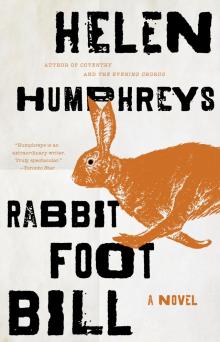 Rabbit Foot Bill
Rabbit Foot Bill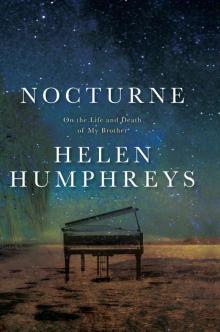 Nocturne
Nocturne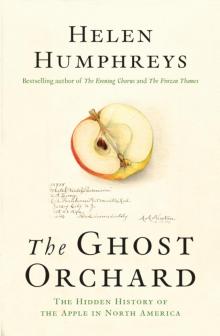 The Ghost Orchard
The Ghost Orchard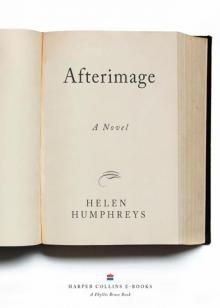 Afterimage
Afterimage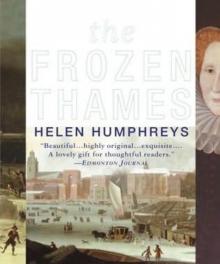 The Frozen Thames
The Frozen Thames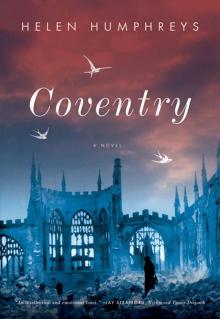 Coventry: A Novel
Coventry: A Novel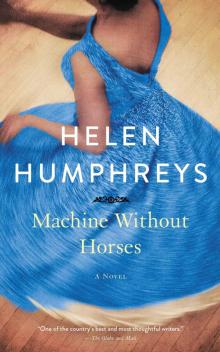 Machine Without Horses
Machine Without Horses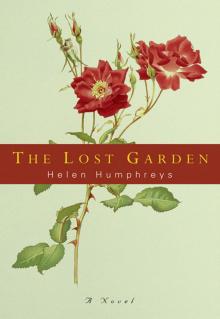 The Lost Garden: A Novel
The Lost Garden: A Novel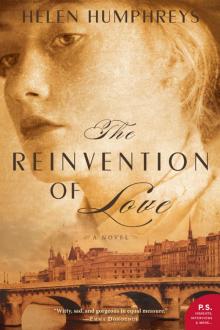 The Reinvention of Love
The Reinvention of Love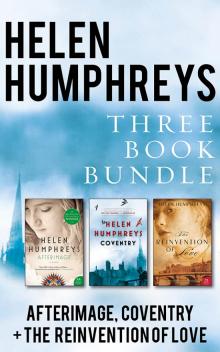 Helen Humphreys Three-Book Bundle
Helen Humphreys Three-Book Bundle